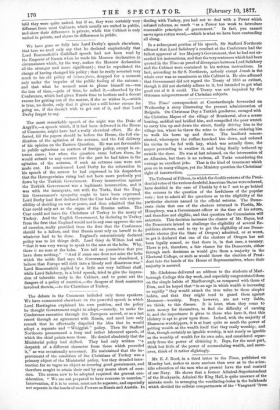The debate in the Commons included only three speakers. We
have commented elsewhere on the powerful speech in which Lord Hartington explained his own position, and the policy he thought Government ought to adopt,—namely, to make the Conference executive through the European accord, or as a last resort through an agreement with Russia, and need here only remark that he effectually dispelled the idea that he would adopt a separate and " Whiggish " policy. Then Sir Stafford Northcote pronounced a long and rather laboured speech, of which the chief points were these. He denied absolutely that the Ministerial policy had shifted. They had only written "a despatch of a different character from those which preceded it," as was occasionally necessary. He maintained that the im- provement of the condition of the Christians of Turkey was a primary object of the Ministerial policy, but they dreaded inter- vention for so vague an object as securing good government, and therefore sought to attain their end by any means short of coer- cion. The course now to be adopted required the gravest con- sideration. "We are not prepared to have recourse to coercion." Intervention, if it is to occur, must not be separate, and especially not separate in the hands of such Powers as Russia and Austria. In dealing with Turkey, you had not to deal with a Power which refused reforms, so much "as a Power too weak to introduce reasonable principles of government." In fact, you cannot carve upon rotten wood,—which is what we have been contending all along.


































 Previous page
Previous page